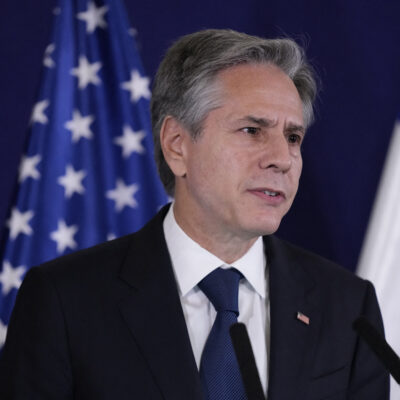House legislators urge SEC inquiry into Unilever and Ben & Jerry’s
The lawmakers argue that Unilever has not properly disclosed the risks to shareholders of the company's July decision to cease sales in 'Occupied Palestinian Territory'

Michael M. Santiago/Getty Images
Rep. Ritchie Torres (D-NY) speaks at a press conference endorsing New York City Mayoral candidate Andrew Yang on January 14, 2021 in New York City.
Four members of Congress led by Rep. Ritchie Torres (D-NY) are urging the Securities and Exchange Commission to look into whether Unilever, the parent company of Ben & Jerry’s, needs to amend its regulatory filing to reflect the risks to the corporate giant’s shareholders following the decision in July to stop selling its products in what Ben & Jerry’s referred to as “Occupied Palestinian Territory.”
Joining Torres are Reps. Andrew Garbarino (R-NY), Josh Gottheimer (D-NJ) and Brian Fitzpatrick (R-PA), who sent a letter on Friday to SEC Chairman Gary Gensler raising concerns about the potential regulatory implications of the ice cream company’s decision.
The legislators argue that the company’s pullout requires Unilever to amend its regulatory filings to disclose the “material risk factors” stemming from the steps taken by five states thus far to divest from Unilever and the anti-Boycott, Divestment and Sanctions laws in place in 30 other states. The letter further describes the independent decision-making authority of the Ben & Jerry’s board of directors as another risk factor.
“In the interests of shareholders, consumers, and public policy, we believe it is appropriate for the SEC to take steps to ensure the full disclosure of all information necessary to make Unilever’s filings in compliance with the rules and regulations of the United States’ SEC,” the letter reads. “Unilever is a widely held company with a current market capitalization of $135 billion, which places in jeopardy the manifold United States institutions, pension funds, and endowments which hold its shares on behalf of its beneficiaries.”
The letter also argues that Unilever may have run afoul of the Securities Exchange Act of 1934 by failing to disclose these alleged risks in its SEC filings.
It goes on to argue that the company’s decision could negatively impact Unilever shareholders due to state divestment from the company, boycotts by consumers and food store chains of Unilever products and costs incurred from state and “potential federal investigations.”









